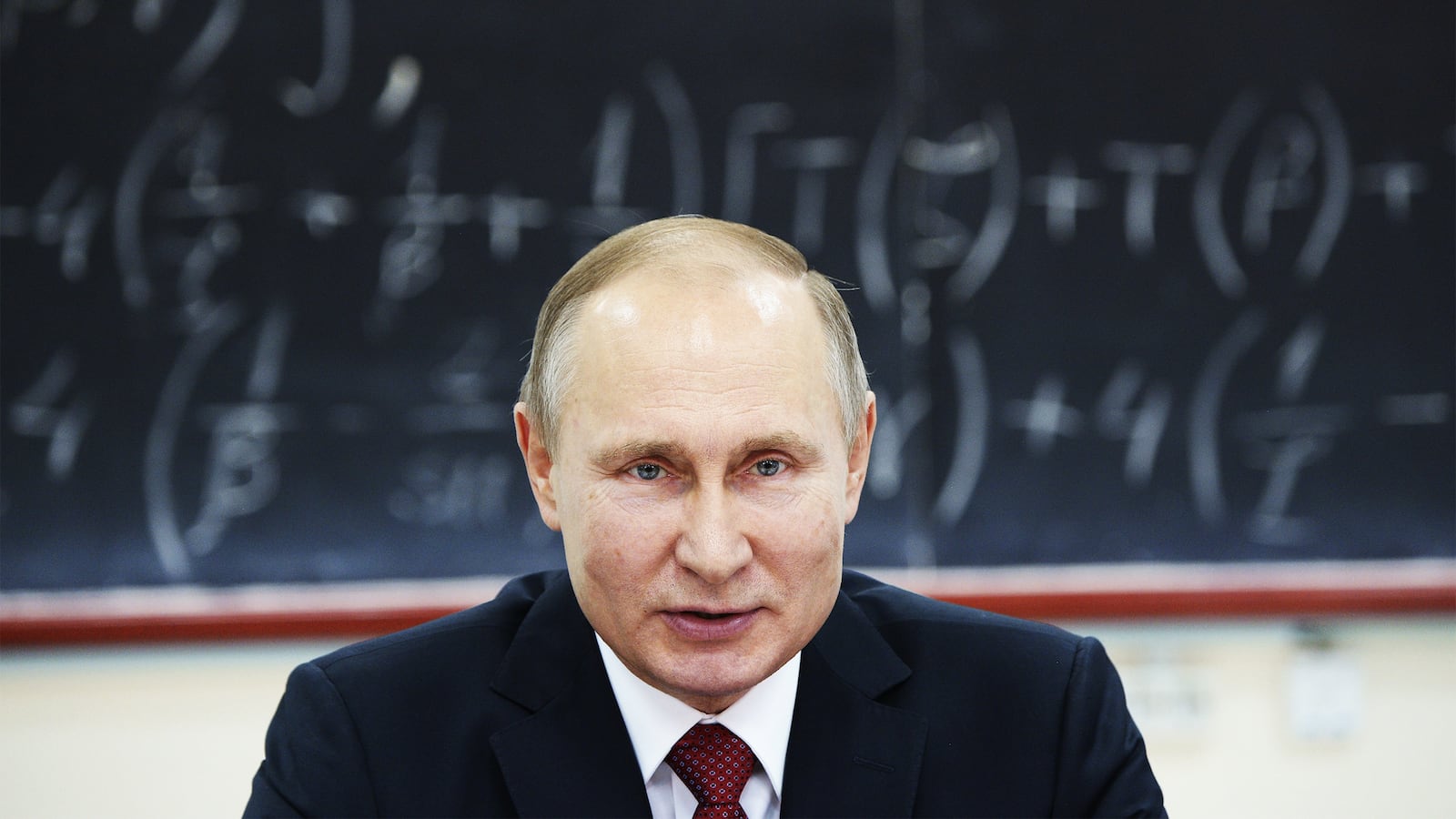Now that British police have announced that Sunday’s poisoning in Salisbury of a former Russian intelligence officer turned MI6 asset, Col. Sergei Skripal, “is being treated as a major incident involving attempted murder by administration of a nerve agent,” Kremlin involvement in the crime seems almost certain. But what was the motivation, aside from reminding Russian spies what could happen to them if they betrayed their country?
It is significant that the poisoning occurred just two weeks before Russia’s presidential elections, with Putin displaying hyped-up belligerence toward the West.
In an address last week to Russia’s Federal Assembly, Putin bragged about Russia’s new nuclear missiles, which he claimed could evade anti-missile defenses and deal a devastating blow to the United States.
And on Monday, Putin gave a rousing speech to officers of the Federal Security Service (FSB), praising them for their success in thwarting foreign espionage plots and reminding them that “the life, rights and security of our citizens must be steadfastly protected from both domestic and foreign threats, from any efforts to hinder us in solving the tasks of our country’s strategic development.”
This iron-fisted image is Putin’s strong card with the increasingly nationalistic, patriotic Russian electorate, who are fed a steady diet of anti-Western propaganda on state-controlled television. Putin of course will win the presidential election, but the Kremlin may be worried that the turnout will be low because of Aleksei Navalny’s vigorous campaign for a boycott of the elections. (Navalny is barred from participating.)
If Russians think that the Kremlin has stood up to the West by killing a Russian traitor, so much the better. And judging from their favorable reaction to the 2006 poisoning in London of former FSB officer Alexander Litvinenko, this week’s attempted killing in Britain could give Putin’s candidacy some much-needed enthusiasm.
As British Foreign Secretary Boris Johnson suggested Monday, the attack on Skripal has clear parallels with the Litvinenko murder. Both Litvinenko and Skripal had been officers in the Russian security services (Skripal served in the Main Intelligence Directorate, or GRU) and both were later granted asylum in the U.K., where they cooperated with Britain’s MI6.
Litvinenko had received numerous death threats before he was murdered, while Skripal reportedly told police recently that his life had been threatened. Litvinenko died after sipping tea laced with lethal radioactive polonium at the Pine Bar of London’s Millenium Hotel. Skripal and his grown daughter Yulia, who also fell victim, had drinks at a local pub in Salisbury before collapsing later on a bench on a shopping street. In both cases, it appears the poisons were those manufactured at special government laboratories and thus extremely difficult to obtain.
Skripal, age 66, had worked for the GRU for most of his career. After retiring in 1999 with the rank of colonel, he took up a position with the Russian Ministry of Foreign Affairs, where he remained until 2003. The next year Skripal was arrested by the FSB for treason. He pleaded guilty, admitting that in 1995 he had begun working with British intelligence and provided them with names of undercover GRU agents in exchange for $100,000. By his own acknowledgement, he continued to work for the British even after he left the GRU.
Skripal’s espionage was reportedly so damaging to the GRU that he was compared to infamous Oleg Penkovsky, a GRU officer who was charged with treason for collaborating with the British and the Americans and shot in 1963.
In 2006, Skripal was sentenced to 13 years in a strict regime labor camp, but he was released in 2010 as part of a swap for 10 Russians who were under arrest for espionage in the United States.
Interestingly, retired FSB Maj. Gen. Alexander Mikhailov, a member of the Russian Intelligence and Defense Policy Committee, claimed that Skripal was suffering from a persecution complex and self-injected too many sedatives: “I believe that this is a maniac syndrome that he’s been suffering from. After immigrating, he’s constantly looked back, worried that somebody could hit him on the head. To calm down he overdosed on sedatives,” the general told the RIA news agency.
How would Mikhailov know details about Skripal’s state of mind? Was this just speculation? Or did he blurt out something he shouldn’t have? There’s a hint here that the Russians had had Skripal under surveillance for a while and might have tried to kill him any time, but they chose now.
Russian law today does not permit the death penalty, even for treason. But, as Russian political commentator Anton Orekh observes: “We are ruled by Chekists, and they have their own code of honor.” (He is referring to the name of the original Soviet secret police that has been used for a century now as the organization changed names and initials to become the Soviet KGB and now the Russian FSB.) “It is better," Orekh says, "to be a real enemy of the regime, a fighter for democracy, than a defector and a traitor to the [Chekist] corporation. The corporation does not forget such things and avenges them whenever possible.”
In 2006, the Russian parliament passed a law that basically authorized the FSB to hunt down and kill Russian enemies abroad. This paved the way for accused FSB assassins Andrei Lugovoy and Dmitry Kovtun to murder Litvinenko, who had become one of Putin’s fiercest critics. And there may have been other murders as well. Sergei Tretyakov, the former deputy chief of station for the Russian foreign intelligence service (SVR) in New York, defected to the U.S. in 2000. His sudden death in 2010 of a reported heart attack at age 53 was viewed as suspicious by many spy watchers.
British authorities are now likely to review 14 suspicious cases. As the BBC reports, the Skripal incident has revived allegations that several deaths "amount to a pattern of state-sponsored murder on British streets," although previously found to have been "heart attacks, suicides, accidents, and death by natural causes."
One victim, banker Alexander Perepilichnyy, eventually was found to have traces of a rare plant toxin in his system. Another, oligargh Boris Berezovksky, was found hanged and deemed a suicide, but the marks on his neck suggested he may have been strangled by someone else.
The BBC lists as other cases: "Gareth Williams, the so-called 'spy in the bag,' whose badly decomposed body was found locked inside a holdall in his bath; Dr. Matthew Puncher, a British scientist involved in the Litvinenko case who was found in his kitchen with multiple stab wounds from two separate knives; and Scot Young, a business associate of Berezovsky, who was found impaled on railings outside his London flat after falling from a fourth-floor window."
British police have said that they found no evidence of Russian involvement in any of those cases, apart from Litvinenko.
In Soviet KGB days Russian spies who defected to the West generally were allowed to live out their lives in peace as an implicit agreement between Russian and Western spy services. Under Putin, the FSB, an independent agency whose main job is domestic counterintelligence, is used to mete out the Kremlin’s vengeance against them. As Putin himself warned when speaking about the spy swap that freed Skripal in 2010: “Traitors always come to a bad end.”
In Litvinenko’s case, the apparent plan was to have him die without anyone discovering the polonium in his body. But Litvinenko, who was exceptionally fit, lived longer than expected. This gave specialists time finally, on the day he died in 2006, to discover that the substance was polonium, a rare radioactive substance that is produced at only one Russian plant, heavily guarded by the FSB.
A subsequent, exhaustive British High Court inquiry concluded in January 2016 that Lugovoy and Kovtun had administered the poison to Litvinenko and that the FSB operation was “probably” approved by the then-FSB chief Nikolai Patrushev and “also President Putin.”
The word “probably” said a lot. Although everyone knew that such an audacious crime on British soil would not have been committed without authorization from Putin and his FSB chief, there was no smoking gun and never would be. Thus, the British response to the inquiry’s findings was a half-hearted gesture: an announcement that the assets of Lugovoy and Kovtun in Britain, which in all probability did not exist, had been frozen.
The British foreign policy group Chatham House predicted: “A weak response or one consisting only of words will merely encourage Russia [to believe] that these acts go unpunished. British and Russian citizens alike who have offended President Putin should therefore continue to live in fear in London.” As the Skripal case suggests, this prediction was accurate.
At home in Russia, Litvinenko’s killers were celebrated. In March 2015, just as the ongoing British Litvinenko inquiry was citing repeated evidence of Lugovoy’s guilt, Putin granted him an award for “services to the fatherland.” A Russian journalist observed at the time: “Public opinion in Russia is the complete opposite of that in Britain. The view here is that these guys [Lugovoy and Kovtun] are heroes because they punished a traitor.”
The Guardian stated the obvious in this latest case: “The biggest question about Sergei Skripal’s suspected poisoning is the timing. Skripal had spent several years in a Russian jail after being convicted of espionage and had presumably been thoroughly debriefed by his former spy bosses. If the Russian security services had wanted him to have an ‘accident’ during those years it would have been very easy to organise.”
But the Kremlin’s apparent goal was not just to kill Skripal or warn potential traitors of the fate that could befall them; it was also to send a message to the West and to the Russian people before the election. As Orekh puts it: “Putin can show videos of superweapons, and they can pour polonium or fentanyl on someone. These are just different parts of the overall plan. And if this is somehow connected with the elections, it is only because it shows that there are tough guys in power here and they will not give up that power for anything.”
Emboldened by the Trump administration’s lack of response to Russia’s aggressive interference in the U.S. presidential elections, and Trump’s repeated denials, in the face of vast evidence, that Putin orchestrates killings of his political opponents, Putin and his Kremlin cronies are telling the West: “You know we did it, and you know and we know you’re not going to do anything about it.”
Interviewed Tuesday about the Skripal poisoning on radio Ekho Moskvy (Echo of Moscow), Litvinenko’s killer Lugovoy, since 2007 a prominent member of the Russian parliament, summed up bluntly the Kremlin’s in-your-face attitude: “Something constantly happens to Russian citizens who either run away from Russian justice, or for some reason choose for themselves a way of life they call a change of their Motherland. So the more Britain accepts on its territory every good-for-nothing, every scum from all over the world, the more problems they will have.”






